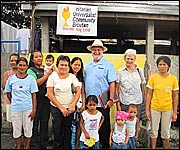Morales visits Unitarian Universalists in the Philippines
UUA president’s visit will renew historic ties with UU Church of the Philippines.
UUA President Peter Morales is visiting Unitarian Universalists in the Philippines from August 26 to September 2. It is the first time that a president of the Unitarian Universalist Association has traveled to the Philippines since UUA President Dana Greeley’s last visit in the 1960s. The Unitarian Universalist Church of the Philippines, which has 25 congregations and more than 2,000 members, has been a member of the Unitarian Universalist Association since 1988.
Morales’s stay in the Philippines was preceded by a short visit to Japan to meet with leaders of Rissho Kosei-kai, a Buddhist denomination that has been the UUA’s longtime interfaith partner and friend. After his stay in the Philippines, Morales will fly to India to attend the 33rd Congress of the International Association for Religious Freedom, where the Dalai Lama will be the keynote speaker.
Liberal religion in the Philippines has roots stretching back to the turn of the twentieth century, when the Philippine Independent Church was formed in reaction to the country’s prevailing Roman Catholicism. American Unitarian leaders encouraged this trend towards liberal Christianity, and when leaders of the Philippine Independent Church came to the United States in 1931 and 1934, they met with American Unitarian Association President Louis Cornish and together visited some American Unitarian congregations. The Philippine Independent Church splintered in 1947, however, ending its connections to American Unitarianism.
Universalism, however, began to develop in the Philippines during the mid-twentieth century, largely through the efforts of the Rev. Toribio Quimada, who was originally ordained by the Iglesia Universal de Cristo. As Quimada’s thinking evolved along Universalist lines, he reached out to Universalist ministers in the United States, gaining the support of the Universalist Church of America. (The Universalist Church of America and the American Unitarian Association combined to form the UUA in 1961.)
Quimada became Universalism’s chief evangelist in the Philippines. In 1988 he was scheduled to attend the UUA General Assembly in Palm Springs, Calif., but was shot and killed a month before the assembly. It is believed that Quimada was executed for his social justice ministry.
In 1985, the Universalist Church of the Philippines changed its name to the Unitarian Universalist Church of the Philippines. In 1988, the UUA’s General Assembly approved changes to the UUA bylaws allowing congregations outside of North America to join the Association and accepted the UU Church of the Philippines as a member congregation.
Shortly after his election, Morales was invited to come to the Philippines by the Rev. Rebecca Sienes, president of the UU Church of the Philippines and Toribio Quimada’s daughter. Morales is visiting congregations in Manila, Dumaguete (where the UU Church of the Philippines’ headquarters is located), Banaybanay, Nataban, and Bagong Silang, among others.
“This is an important trip because Morales has cast a vision of a multicultural Unitarian Universalism,” said the Rev. Eric Cherry, head of the UUA’s Office of International Resources. “The global reality of our faith can be a source of inspiration and hope for multicultural change in our American churches. This visit will also be an opportunity to renew the close and interdependent relations between American and Filipino UUs.”
Morales, who visited Unitarians in the United Kingdom and in Transylvania during his first year as UUA president, is planning a longer trip to India at the end of February 2011, when he will meet with partners of the UU Holdeen India Program and Unitarians from congregations in the Khasi Hills of northeastern India.
See sidebar for links to related resources.








